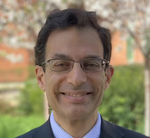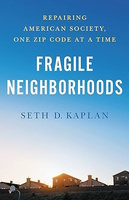
This year, I decided to forgo my annual philanthropic predictions for the coming year (2024) and dive into an issue that I think we all struggle with: trust. Who do you trust to tell you the truth? Which politicians can you trust, if any? What information that you read on the internet is trustworthy? These and many other questions swirl around the issue of trust, leaving many of us scratching our heads. But knowing who or what to trust is just the tip of the iceberg, as they say. Trust is the basis for the work that we do as nonprofit organizations, educational institutions, social enterprises, and yes, even governments.
To help sort through part of this complex issue, I turned to Seth Kaplan, author of a newly published book, Fragile Neighborhoods: Repairing American Society, One Zip Code at a Time, “an urgent exploration of why American society is in trouble, and how to fix it, starting with the places we call home.”
This interview is the first in a series of articles exploring the topic of trust.
Cynthia: Thank you for taking the time for this interview, Seth. I truly appreciate your time, especially at this very busy time of year. Clearly you have given great thought and research into this topic of trust and building trust, particularly within communities.
Seth: Building trust is never easy. Doing it in a way that scales up an organization, embeds a large number of people in a network of mutually enhancing relationships and institutions, and raises expectations and norms across a locale—increasing social capital and collective efficacy in the process—is rare.
Cynthia: Truthfully, when I decided to write a short series on ‘trust’ for my year-end article, I hadn’t actually thought of it in terms of neighborhoods or communities. I really just thought of it in terms of the individual.
Seth: Low trust among individuals tells only part of the whole story. Neighborhoods marked by low trust are less likely to have residents who collaborate—formally or informally—to advance individual and common goals. While scholarly research highlights some of the ingredients critical to general levels of trust—and how these levels affect social and economic outcomes—few sources exist for learning how organizations can systematically secure and sustain trust within a specific population. Philanthropists, nonprofits, and public institutions rarely consider the trust problem when they seek to address various social problems.
Cynthia: How so?
Seth: They don’t usually ask questions such as: What secures, sustains, or diminishes trust with my organization, staff, or initiative? What role does this trust play in the success of projects? What projects can enhance a neighborhood’s social capital and general social trust?
Thinking beyond the material to focus on the social is essential to many initiatives, especially in fragile states, societies, and neighborhoods. When general social trust is low among residents and they cannot easily form supportive networks or act collectively to enforce norms on their streets, and when they are too cut off from society to connect to opportunity, they lower their expectations for their locale—and for their role in it. This pessimism can have a cascading impact on other residents and the institutions that bind and shape them.
Cynthia: Is it possible to change this dynamic?
Seth: In my book I talk about Life Remodeled (LR) (Detroit) and Partners for Rural Impact (PRI) (Eastern Kentucky). Both organizations have shown how to change this dynamic through leveraging local talent, sequencing activities and programs, and adapting to and bolstering local contexts. These two organizations demonstrated how instead of primarily asking “what” and “where”—as we typically do in project-mode—we should start by asking “who” and “when.”
Cynthia: When you say we should start by asking “who,” what does this mean?
Seth: First, hiring locally and embedding staff within communities is essential to developing the kind of inside-out perspective and approach that will build trust and reflect local needs. LR and PRI make this an explicit part of their strategy. Each organization is based in their target geography, and each prioritizes hiring people either from or familiar with their communities.
And the who question doesn’t stop with hiring. Both organizations empower local leaders and local staff to make critical decisions. PRI delegates decision-making to people on the ground—where it is likely to be most dependent on local knowledge and preexisting relationships. LR empowers its advisory boards and staff from the places where it operates. In both cases, the organizations make decisions in close consultation with local officials, partners, social leaders, and staff, creating an accountability that is not present when decisions are made far away or based purely on technical knowledge. As a result of all these efforts, both organizations became accountable to partners and citizens in a way that is improbable when an organization only focuses on material goals and depends on outside support to operate.
Cynthia: This makes a ton of sense. For many, many years, the Campaign for Human Development (a philanthropic arm of the Catholic Church) has been pushing this concept. In fact, they only support initiatives whose Board is made up of “people on the ground,” as you say. And you said we should start by asking not only “who,” but “when”?
Seth: We must recognize how slow and incremental securing trust can be. LR discovered that the graduated sequence of its projects mattered: They had more success starting off small in a new area before trying to launch a larger project. Through trial and error, LR gradually developed a way of working with residents and a sequencing of activities that rooted it in the local neighborhood and secured local residents’ trust. Similarly, PRI learned that growing incrementally and first experimenting with models, building relationships and skills, and earning the trust of community members were essential.
Cynthia: But you must also ask “what” and “where,” right?
Seth: Yes, that’s the next step. The success of one’s own efforts often depends on first addressing barriers in the overall social context in which one operates. Any action that is part of or complementary to your initiative—and enhances trust and social capital in the community—will likely further one’s own goals in time. Instead of just recruiting tenants, LR sought out organizations interested in building a collaborative community and working with residents to revitalize the neighborhood. It did not just offer services to residents but sought to weave them together in a way that would strengthen social ties and advance their interests. Similarly, PRI sought to run programming (e.g., its dual-focus approach) and build up staff, partners, and local institutions (e.g., its openness to staff moving to partners) in ways that would contribute to the counties where it worked.
Finally, each effort must be adapted to the local context. In Detroit, LR established a critical role for local advisory groups to influence larger projects such as the Durfee Innovation Hub. In Kentucky, PRI customizes what programs it runs in each county or school district. While scaling up is important, customizing the model for each particular neighborhood or area is essential for lasting success. It recognizes the individuality of local leaders and their talents, the unique history of a given community, and the necessity of finding paths forward that are determined and taken together, and slowly.
Cynthia: This is all very fascinating, Seth. I am eager to read the book, and even more eager to apply this approach. Thank you for writing a book which, I believe, will help many organizations approach the work they do with a deeper understanding of how to achieve their missions.
 ABOUT SETH D. KAPLAN
ABOUT SETH D. KAPLAN
Seth D. Kaplan is a leading expert on fragile states. He is a Professorial Lecturer in the Paul H. Nitze School of Advanced International Studies (SAIS) at Johns Hopkins University, Senior Adviser for the Institute for Integrated Transitions (IFIT), and consultant to multilateral organizations such as the World Bank, U.S. State Department, U.S. Agency for International Development, and OECD as well as developing country governments and non-governmental organizations.
Contact Seth
- Email: seth@sethkaplan.org
- Website: sethkaplan.org
Fragile Neighborhoods:
Repairing American Society,
One Zip Code at a Time
